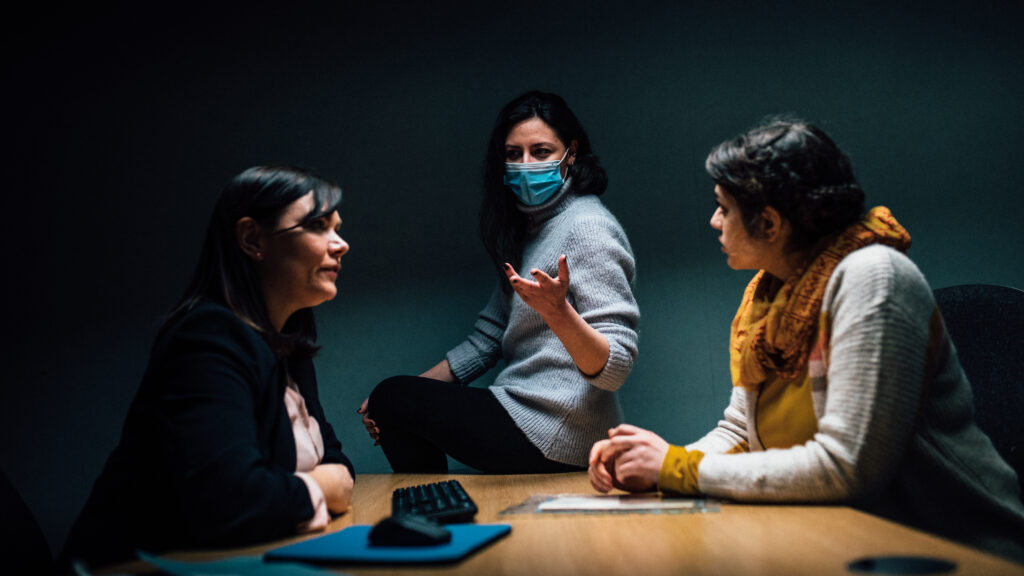

When did your interest in filmmaking start and what were you doing before you became a filmmaker?
I’m a Palestinian filmmaker from Gaza. I did my BA in Journalism in Palestine and worked as a TV reporter and a documentary filmmaker.
In 2015, I moved to Scotland and did my MA in Film Directing and started building up my career in drama filmmaking.
Tell us a bit about your Sharp Shorts-supported film.
Go Home is my professional debut short film. It is a political drama set in a UK immigration centre about two women from different backgrounds but they share a need for home, freedom and acceptance.
The main character is a Palestinian refugee who is putting up with the tough and bureaucratic asylum process in the UK, in the hope that she can be free to stay. She deals with a disillusioned Polish asylum officer who decides to leave the country for good. The film shows a moment of connection between two women at two very different points in their relationship with the UK.
What did you learn through taking part in Sharp Shorts? How was your experience working with the Short Circuit team?
The Sharp Shorts scheme has recognised my voice as a film writer/director by supporting my short film Go Home. Through a series of development sessions, my script has greatly evolved with feedback that resonated with my vision.
Also, the access to many great masterclasses and mentors has enhanced my practice and given me a valuable insight into the film industry in Scotland.
“The Sharp Shorts scheme has recognised my voice as a film writer/director by supporting my short film Go Home. Through a series of development sessions, my script has greatly evolved with feedback that resonated with my vision.”
What was your creative process? How did you get ready to make your film?
I like to be close to reality and truthful to the experiences of the characters I examine in my drama pieces – visually and in storytelling – therefore I went for a naturalistic style. I tried to combine the elements of drama and documentary. The actors have lived similar experiences and recalled those experiences on screen. I also worked with non-actors from the refugee community in Scotland.
Scenes with refugees are very documentary-like and I used improvisation techniques where the refugees led the scene and spoke truthfully about their experiences.
The extras in the security check queue scenes are actual refugees who live in the UK and went through similar process to get their stay. According to some of the them this was their first time on a film set, and it was their hundredth time in a security queue!
Why do you feel stories like this are important?
Go Home speaks of the different backgrounds and nationalities who live in the UK but feel alienated by the UK’s policies towards foreigners. The Go Home team was diverse and included people from many different backgrounds who live and work in the UK and call it home, a team who believe that diversity is enriching and empowering.
It was great working on this film, it’s an important subject matter that’s close to my heart. I look forward to seeing the film come to the light and raise awareness about the experiences of refugees and immigrants whilst highlighting their hopes and struggles.
What was the greatest hurdle you encountered whilst shooting, can you tell us how you overcame that?
I honestly can’t think of any, I think we had an ideal shoot! Everything was well planned and discussed in detail beforehand, the shoot ran smoothly and we managed to get all the shots we wanted. I had a great team – we were getting on so well and everyone knew what they were doing.
The only hurdle I can think of was shooting during COVID-19 and that being behind a mask created a barrier. However, we had enough excitement to overcome that barrier and enjoyed every moment of being on the film set.
How easy was it to navigate the COVID-19 situation? What support did you have?
We filmed Go Home in Glasgow in late January 2021, under COVID-19 restrictions, where the full cast and crew had to be tested before the shoot – gladly we all passed! We maintained social distancing on the set and kept our masks on. Despite all of that, it was an enjoyable experience and we were excited about being on set and making a film.
What piece of advice would you give to someone looking to apply for Sharp Shorts?
My advice to filmmakers who want to apply for Sharp Shorts is be truthful to yourself and make a film that matters to you.
Apply with a project that you’re emotionally invested in that allows your creative vision to flourish.
Go Home is produced by David Jack and Paul Welsh (DigiCult).
Interested in applying for Sharp Shorts? Applications are now open until 10am on Monday 17th May.